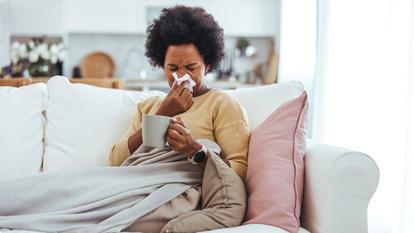The content in this article should not be taken as medical advice. Please consult with your healthcare provider regarding your individual health needs.
Have you ever wondered why your blood sugar levels suddenly go up when you’re sick, even if you’re keeping an eye on your diet? When you’re feeling under the weather, your body is dealing with a lot more than just the symptoms you notice. The truth is, your body’s response to illness is surprisingly complex, especially when it comes to managing glucose.
Let’s examine what happens in your body during illness, why glucose spikes are so common, and what you can do to manage your glucose levels.
Your body’s natural stress response
When you catch a cold, the flu, or any other infection, it triggers a stress response in your body. This is a natural, protective reaction designed to help you fight off the illness. Your body releases stress hormones like adrenaline (also known as epinephrine) and cortisol, which signal your liver to release extra glucose into your bloodstream. This provides a quick source of energy for your immune system to combat the infection.
Unfortunately, this increase in glucose can be problematic if your body is struggling with insulin resistance or if you’re not producing enough insulin. High-stress hormones make your cells less responsive to insulin, meaning the insulin can’t effectively move glucose out of your bloodstream and into your cells. This is why your blood sugar may be high when you’re sick.
The role of inflammation
Illness often brings inflammation, another natural process that helps your body fend off bacteria and viruses. However, inflammation can also make your cells more resistant to insulin. This reduced insulin sensitivity can lead to more glucose staying in your bloodstream than usual, which contributes to higher blood sugar levels.
Changes in eating, activity, and medication
When you're ill, your regular habits around food and activity often shift too. Maybe you’re eating less, or maybe you’re craving comfort foods that aren’t in your usual routine. You might also be more sedentary, resting on the couch or staying in bed. All of these changes can affect your blood sugar.
Certain cold medications, especially those containing decongestants or sugars, can also elevate glucose. Decongestants may trigger glucose release from the liver, while cough syrups and lozenges often contain sugar, which can also contribute to unexpected spikes. If you’re on steroids, such as prednisone, to manage inflammation, you may experience even more significant increases in blood sugar.
It’s always wise to check in with a pharmacist or your healthcare provider before taking any new medications to ensure they won’t interfere with your glucose management.

Tips to keep blood sugar steady when you’re sick
Knowing your body’s glucose might spike when you’re ill, here are a few tips to help you keep things in balance:
1. Stay hydrated
Keep sipping water and sugar-free fluids throughout the day. Dehydration can cause glucose to rise, so aim to stay hydrated with drinks like water, broth, or low-calorie electrolyte options.
2. Check your glucose levels regularly
Tracking your glucose with a glucose biosensor, like Stelo, can help you catch any significant changes early, giving you a chance to adjust your food or medications accordingly.
3. Consult with your healthcare provider
If you’re living with diabetes, it’s a great idea to have a sick day plan in place with your doctor. They can help you adjust your medications if needed and recommend over-the-counter meds that won’t interfere with your glucose levels.
4. Rest and recharge
Sleep is crucial for recovery. When your body rests, it has a better chance to heal, which can help stabilize blood sugar.
5. Move around (if you feel up to it)
Light activity, like gentle stretching or a walk, can help reduce glucose levels. But don’t push yourself if you’re feeling too fatigued.
6. Prepare nutritious, easy-to-digest foods
If possible, have some healthy, easy-to-prepare foods available—things like soup, whole-grain crackers, and yogurt are often gentle on the stomach and provide the nutrients you need for recovery.

Feel better
When you’re sick, remember that it’s okay to slow down and take extra care of yourself. Even though managing blood sugar on sick days can be a challenge, these strategies can help you stay on top of it, so you can focus on what matters most: feeling better.

Curated & reviewed by: Kristyn Milburn
MSN, NP-C, BC-ADM, CDCES
MSN, NP-C, BC-ADM, CDCES
Kristyn Milburn is a dedicated nurse practitioner and diabetes care and education specialist, holding board certification in advanced diabetes management.

